 15Likes 15Likes
 |
|

30 Dec 2014
|
|
Registered Users
Veteran HUBBer
|
|
Join Date: Nov 2012
Posts: 132
|
|
|
Live Update
Greetings, Merry Christmas and a Happy New Year Friends!

Though I returned to Venezuela almost a month ago with the intention of continuing rapidly to new countries, I am still here.
I can never stress enough how incredibly beautiful this country is, let alone the warmth and camaraderie of the people. But at this point it is Georgia who is keeping me at bay. She lies in many pieces, in need of a serious engine rebuild. The piston head, rings, gaskets, valves all need work and replacement.
I was losing a liter of oil every 500km!
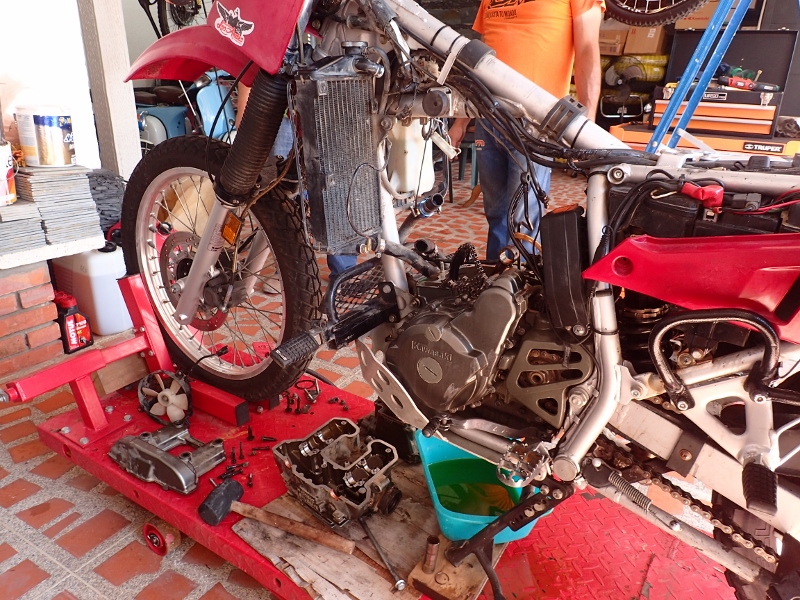
I think I should be back on the move shortly after the new year, in case any of you crazy cats are in the vicinity of Venezuela or Colombia.
I hope the new year bring you the time to ride, the health and strength to do it, and the wisdom and fortune to always return home.
I will post the next story - from Guatemala!! finally right? next week.
Fraternally,
Alexander
|

6 Jan 2015
|
|
Registered Users
Veteran HUBBer
|
|
Join Date: Nov 2012
Posts: 132
|
|
|
Guatemala - Sweat, Blood, and Books
Guatemala - Sweat, Blood, and Books
Maria
A few years ago, while still teaching in New York, I helped a friend with a fundraiser for a Guatemala based NGO, which for some reason sparked a desire to come and see things for myself. If nothing else, this crazy journey of mine has made so many of my dreams come true – which included experiencing Guatemala. I say experiencing rather than seeing because there are two ways of going about being present in this country: one is staying on the Gringo Trail, which will bring you to beautiful places and colorful markets, but will ensure that you see practically nothing of the real Guatemala or life there; the second option is to dive head first into one of the poorest countries on earth with a bloody history that began with the conquistadors and ended only a few years ago at the end of the last civil war. Travelers love Guatemala for the beauty of its lakes and volcanoes, the vibrant colors of dresses and markets, and the pennies it costs to stay here. But few dare to venture beyond the Gringo Trail, and giving them the benefit of the doubt, the danger is what keeps them at bay. Extreme poverty, to a large extent brought on by American corporations and the CIA (as in most of Central America), means a high prevalence of armed robbery – on buses, on the roads, and on the streets. Recently unemployed guerilla fighters with little to do is another good reason to hug that trail. But I am no tourist, and so I sought the poorest corners, the most dangerous roads, and was rewarded with moments and people I will always hold dear.
Coming in from Belize, I entered El Peten – the largest state, the poorest state, and the most replete with incredible Mayan ruins. My mind being saturated by the ruins of Mexico, I sought only the people, only the more recent history of Guatemala. And, thanks to couchsurfing, I found it right away, and to an extent and intensity of which I never dreamed.
My education began on my very first days in El Peten. My host, Maria, who works as a women’s rights and education advocate in a newly formed municipality, helped me see what few others could. Maria belongs to a club more exclusive than the richest Spanish clubs of the capital – she is an educated woman from the country. In a land where the majority of girls are married by 16, and well into motherhood by 18, Maria stands out as a shining beacon to the power of reading and education. In a homophobic, fanatically catholic, patriarchal society, Maria loves all, centers her faith on humanity, and works actively to empower and educate women. And I met her, I stayed in her home, I bore witness to what is possible.
A few years ago one of the neighboring mother’s died, leaving a 9 year old girl in the “care” of her older siblings. After a few years of using Tarol as a maid and servant, they decided they no longer wanted her around. Maria, barely in her 20’s at the time, adopted Tarol, and gave her not only a home, but the opportunity to go to school, to have a life and a real future. Soon after, Maria graduated with her B.A, in spite of the financial difficulties of sustaining her adopted daughter, and went to work at Las Cruces – a recently formed municipality built to represent 42 indigenous communities from the far reaches of the Guatemalan jungle. I offered to volunteer at Las Cruces, to help her and the community as best I could, and spent the next week living there.
 Las Cruces
Las Cruces
When you think of poverty, of dusty ill-maintained roads, shacks built of whatever material is available, often with sheet-metal roofs, poorly equipped schools, and staggering survivors of civil war massacres… one of the places you can picture is Las Cruces. When the last civil war swept through Guatemala, the poorest of states, as usual, suffered the most. El Peten saw many massacres and much bombing. One horrific day, in the fields not far from Las Cruces, 650 people were massacred. Many children were dunked in wells until they drowned, many more never saw the light of day. I met with a would be mother of 12, Doña Hortensia, who lost two children to complication revolving around being thrown to the ground to escape the blasts of bombs, and another, a 5 year old girl, to complications from the shockwaves of those very bombs. I sat listening to her and her husband, to one of her daughters, while a granddaughter played happily, completely unaware of the miracle of her existence. Her face, so young, so pretty, held a strength and intelligence which is so fragile in these circumstances that it hurts to think about it.

Las Cruces still sees a shocking number of girls as young as eleven impregnated. The roads are bad which limits aid and access, there are too few school and almost no books, the farming produces little variety and little more yield which keeps the economy from ever expanding. That her parents survived to have her is one miracle, but if she somehow manages to learn and grow and be a force of change and growth (like Maria), it will be a greater miracle yet.
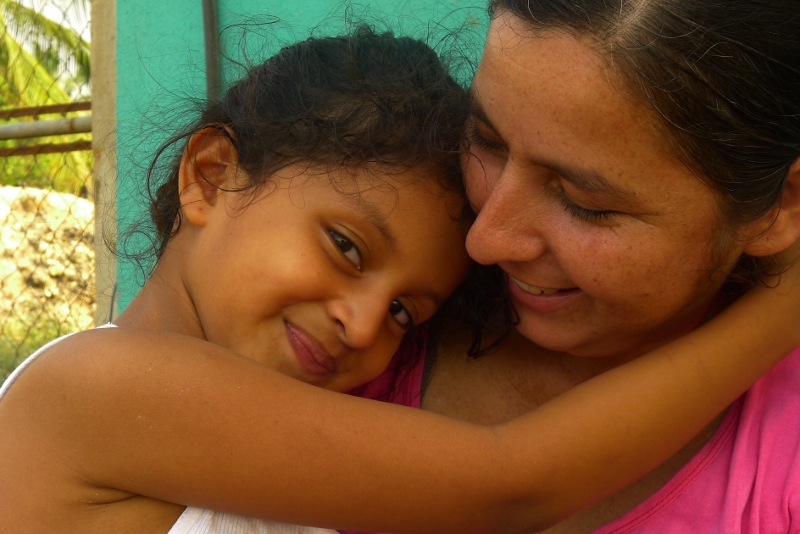
Beside my time at the municipality, I went to visit some of the schools in Las Cruces; as a teacher it is generally the first place to which I am drawn. What I saw gripped me with an intense sadness and fear for the future. The schools were all built of concrete with tin roofs (deafening when there’s rain). For windows there are gaps in the concrete with chain-link fencing for windows. There are no books – no books! At most the teacher will have a single text book for each subject from which they read while students copy down the information. Besides not having books teachers have to find and make all the materials they want to use in the class. The eefectiveness of this is further diminished by a lack of teachers who specialized in the subject they are teaching. This is particularly true of English teachers – those who bother to master the language don’t go into teaching. Most of the teachers are just high school graduates who themselves never read a single book. That means that a recently graduated high school student will teach current high school students who wish to become teachers, reading from the same book he just finished copying, and relaying absolutely no new information onto the students… and thus the cycle continues year in and year out. It is the reason almost nothing has changed since the conquest 400 years ago. Those in poverty remain in poverty and have almost no legal way by which to escape.
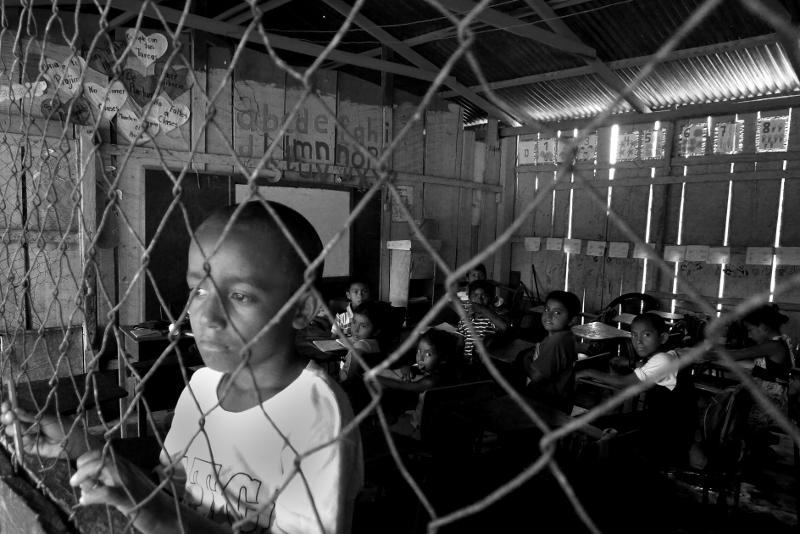
Still, there are some libraries, and when I was not answering the student’s questions about the U.S and Russia and my own crazy life, I was encouraging them to read, giving them the titles of my favorite books, and doing what little I could to make them aware of the cycle in which they are stuck and giving them hope of becoming the change. It felt so good to be in a classroom again, to share ideas with bright, eager minds, of seeing hope and excitement and even a little learning. If becoming a teacher was the hardest thing I have ever had to do, then leaving the classroom was a very close second.
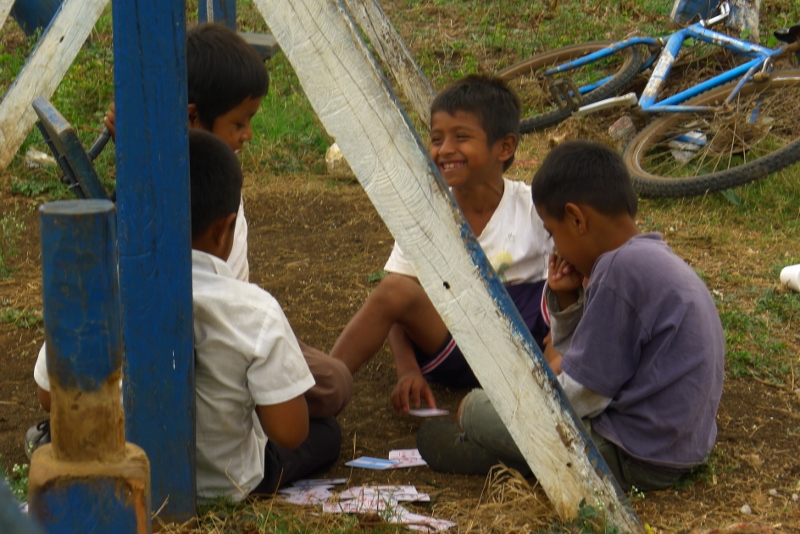
In the hours I was not volunteering, I sought the pure and cooling waters of the source of a river a few miles from town. Sure the flies, and ants and wasps, and gnats aren’t too pleasant, but they are more tolerable than a breezeless heat. There was nothing else that could cool the permanent state of sweat in which I was living. The jungle heat in El Peten is otherworldly. The lethargy that overcame me is difficult to describe – I was so hot and exhausted that I could barely think. I would sit in front of pen and paper and no thoughts would come, only the burning of sweat dripping into my eyes would recall me from the stupor into which I would fall dozens of times a day. The local padre took me in and gave me a room in the little cement cube adjacent to his house. We moved the sacks of corn and beans to the side and threw down a mattress. There’s electricity, and a bathroom, but the water doesn’t work right, so it’s to the bucket I go to wash myself and flush the toilet. In that little room I spent my nights tossing and turning in the heat, kept awake by the crashing of mangoes on the tin roof, and the buzzing of flies and mosquitoes around my head.
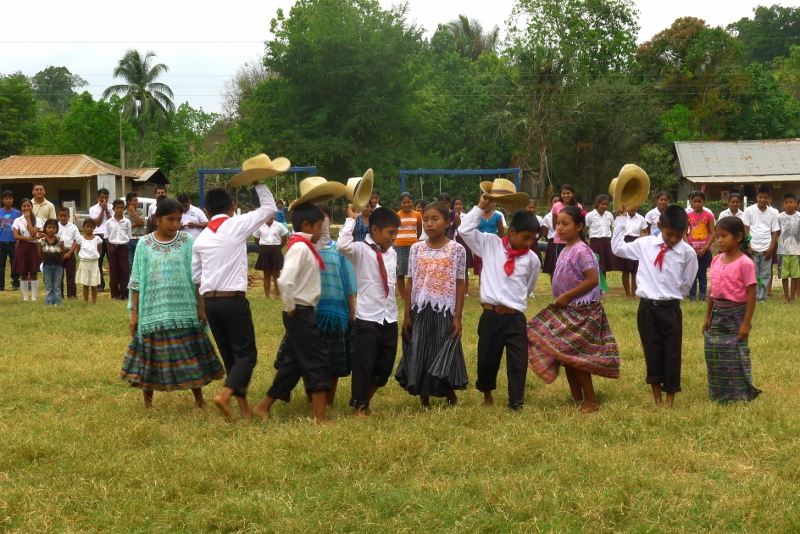 Padre
Padre
For the first month or so I couldn’t understand Guatelmateco (The Spanish spoken in Guatemala). Entire sentences rushed past my ears with often not a word understood. The form of speech sounds more like barking – quick successions of phrases that grow louder from the first word to the last – like graphs of exponential equations. I feel stupid as I look into people’s mouths, and search in desperation for some sort of context clue to help. I find myself asking people to repeat themselves, and use other words, in almost every conversation. Sometimes they do, and it still doesn’t help, at others they just repeat what they said before, and I am left nowhere.
Talking to the padre while swinging and sweating in the hammock, with eyes dried out from the dust no rain has calmed in months, the lights went out for the 3rd time this week, leaving the village in complete darkness. It was harder to see his face, and therefore harder to understand, but we don’t give up because we each feel the importance of our moment together. We laid in those hammocks for a long time, talking of the state of Guatemala, the natives, the church, education, agronomy, Italy, communism… I was hoping he would agree to host me for exactly this reason. Speaking with locals can be an interesting process: they may know well the things that occurred to them, but are often incapable of placing the events in a larger context because they know little outside their own lives. Those who have TV more often watch Novellas, soccer matches, and sometimes the news – but the news does little to teach people about what actually occurs. The padre was a local, but had traveled outside Guatemala, had been educated, and therefore was able to bring that local knowledge into the greater context of our world, which made him all the happier that I could bring a little more of the world to him.
That night was one of the worst in my life – doubled over and writhing in pain. I then took my second dose of antibiotics in 30 days. Before this, I can’t even remember the last time I took antibiotics, or had to go to a doctor – the road is a cruel mistress… but my mistress nonetheless.
I wish I could have stayed longer, but the heat made me function at a quarter capacity and I could do little good. My week volunteering at Las Cruces, however, served to remind me of how much I love volunteering and working with kids, and so I made it a point to keep my eyes open for another opportunity to do so (perhaps in a place slightly cooler and more suitable for a Russian). Guatemala and fate did not disappoint me, and the following week I was presented with the opportunity to volunteer at an orphanage. It would be the most satisfying weeks, followed by the single saddest day of my journey.
|

6 Jan 2015
|
|
Registered Users
HUBB regular
|
|
Join Date: Sep 2013
Location: South West France
Posts: 34
|
|
|
Thankyou again
Your posts are a refreshing view on the realities of the road, I salute you and also envy you, keep up the good works and writings.
|

8 Jan 2015
|
|
Registered Users
Veteran HUBBer
|
|
Join Date: Nov 2012
Posts: 132
|
|
|
Map update
Hello Friends!
A quick break from the alternate timeline. Here is my map of Venezuela.
I'm now back in Colombia and in a few weeks will enter Ecuador!

|

8 Jan 2015
|
|
Registered Users
Veteran HUBBer
|
|
Join Date: Nov 2012
Posts: 132
|
|
Thanks Canyon! I'm glad someone reads along with my journey 
and the photos will get better, i promise...
|

11 Jan 2015
|
|
Registered Users
HUBB regular
|
|
Join Date: Aug 2014
Posts: 30
|
|
|
What a very descriptive trip
Have been reading your dialogue of your adventures. and hoping your health is back to normal. Your discriptions of your travels is very inspiring. will look forward to your future comments, and hope everything goes in your favour.
|

11 Jan 2015
|
|
Registered Users
Veteran HUBBer
|
|
Join Date: Nov 2012
Posts: 132
|
|
Thanks Lectron!
My health is back to normal! It was a very long recovery, but it seems i'm cocked, locked and ready to Rock.
By the way, you are reading from about a year and a half ago, I am actually much further along... i needed time to develop the notes I took so I did not post for quite a while 
|

12 Jan 2015
|
|
Registered Users
Veteran HUBBer
|
|
Join Date: Nov 2012
Posts: 132
|
|
|
Guatemala - The Crash
Guatemala – The Crash
After a month of living in the “real” Guatemala, I finally hopped on the Gringo Trail – Quetzaltenango (Xela). I came to the center of NGO activity and volcano excursions to give myself the chance to work or volunteer again, and to see the famed, lava spewing, volcanoes. And though I got close to achieving both goals, in the end I came away with little more than myself intact, and even for that I was thankful.
I was staying in a place with no sink (the shower being the only source of water, and only cold water at that). The single room has no window, and smelled of old brie. It’s kind of Willy to share such a small space with me and give me a place to stay, but I could not see myself inviting someone to stay if I lived in such a place. This brought me to a rare decision to move to a hostel, before finding a fellow photographer who become the best part of Xela.

Other than an artist party and an excursion to a rare, underground Gay bar (they have to pay off the cops to stay open), Xela had been relatively uninteresting. I had not brought myself to climb a volcano yet, I wasn’t doing enough writing, and no NGO’s had piqued my interest. I spent days playing chess with a French guy I had met, or hanging out with my photographer friend and his sister.
Finally I decided to go to the famous market in Chichecastenango (one of the biggest and most colorful markets in the world). I needed something to get me out of Xela and feeling like I’m doing something. I decided to take Caroline, a Chinese-Canadian girl I met a few days before. We started in the morning, and were soon on a beautiful, twisty, well-paved, mountain road. The weather was fine and cool – a perfect day for a ride. The 4 lane highway wound up and down the mountains, with big curves that begged for speed. The road itself was in excellent condition – well marked, clean, with side barriers and few cars. The first hour was some of the best riding I had done in a very long time.
I had just finished a series of tight curves which threatened to scrape my pegs, and began yet another descent down a slope which begged for my usual speed of 75 mph. We crested a rise and were approaching a gentle curve and for some reason I decided to slow down a bit. We were going no faster than 50mph, when all of a sudden I saw Georgia drop and slide away from me. Apparently the whole curve was covered in gasoline/oil. I can still see it in slow motion as I was suddenly flung to the ground, at first facing my bike as she slid down the hill, then the top of the curve as I got turned around. I decided not to roll for fear of hitting the barrier - before which I stopped only a few feet away (had I not dropped my speed there is a great possibility you would not be reading this right now). By the time I stopped sliding I heard Caroline’s voice asking if I was OK. I wasn’t sure, but had enough sense to ask her if she was alright as well. She said yes, and so I allowed myself to drop back for a few moments to recover from the shock. Thankfully there was a car just behind us. The man and his wife pulled over, called to some people up the road, and rushed to help me. I told them I was fine for the most part, and was then urged to go get the bike upright as it was leaking gas. I struggled to my feet and saw Georgia lying upside down, pressed against the barrier. The man pulled her off the rail by himself, and by the time I hobbled over, a few others had joined us and helped set her upright.
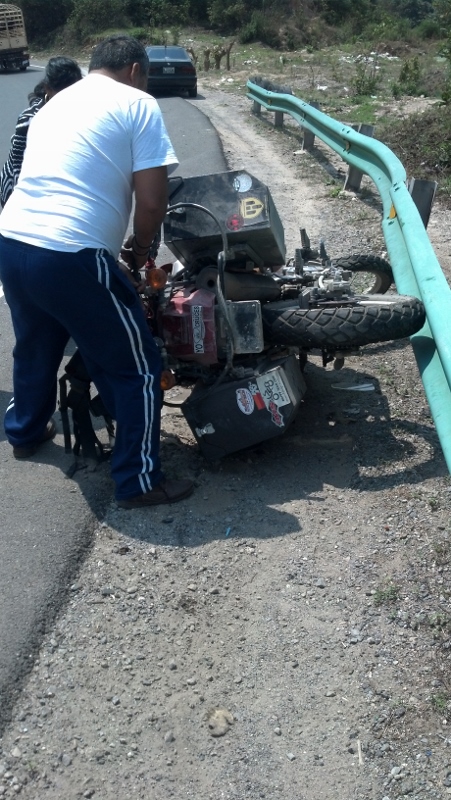
Of course I was not wearing my motorcycle jacket or pants. So my one pair of jeans, my shoes, my gortex jacket, fleece, long sleeve, and t-shirt were torn to shreds. Thankfully I kept most of my skin, and suffered only bruises as opposed to broken bones – a real possibility had I hit the barrier. The pain was pretty bad, but slowly I began to realize just how lucky I was.

The cops came quickly, called an ambulance to get us cleaned up and a truck to bring my bike back to Xela. The alcohol on the burns was not too pleasant, but was still better than the 900 QTZ (talked down from 1500) I had to pay to get my back to town. I didn’t even want to think about what it was going to cost to fix everything.

However, though Georgia’s windshield, instrument panel, cell phone mount and panniers were smashed, the gas tank was in one piece, and the engine suffered no damage. Though there was a car so near to us that they immediately pulled over, it was not so close that we slid into, or under, it, or it into us. Though my clothes were torn, the bags with our cameras strapped to the back were perfectly fine. My cell phone, though it flew off the bike, appeared as though nothing happened to it. And finally, regardless of the pain, swelling and bleeding – both Caroline and I were alive. In fact she barely had a scratch on her.

It is a horrible and stupid way to learn a lesson, considering how long I’ve been riding and everything I know about riding. But it took that crash to make me wear all my gear, all the time, no matter how hot it may be.

By the time I had finished recovering from the crash the rains had finally arrived. My opportunity to hike the volcanoes disappeared with them, and the dry season would not come for many months yet. I had found a couple of interesting possibilities for writing, volunteering, and even directing a school, but nothing panned out in the time I expected. Between the school not being ready yet, and people disappearing for days on end in the country (where they run their NGO), my impatience got the better of me and I decided to leave. I regretted missing the chance to write about uniquely developing multi-cultural villages along the coast, but my preconceptions of Guatemala were interfering with my perspective and patience. It is a great fallacy of travel which I have since managed much more effectively, but by then it was too late and I made my decision to ride on.
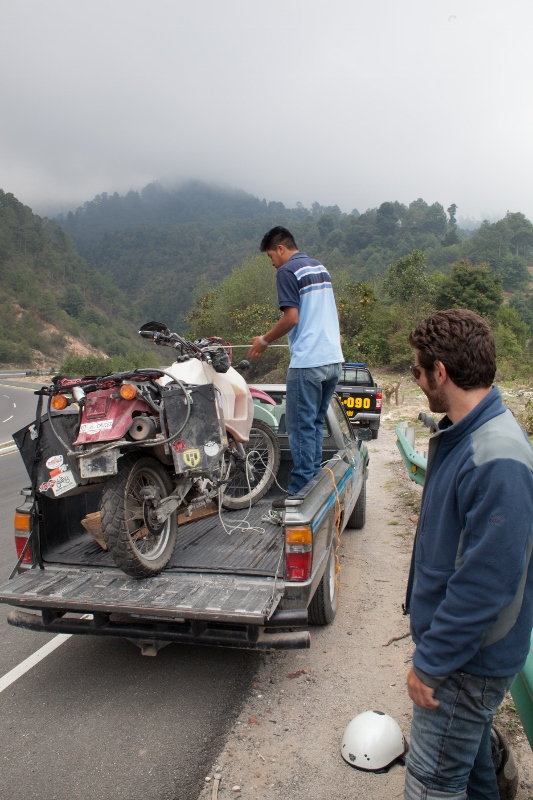
|

27 Jan 2015
|
|
Registered Users
Veteran HUBBer
|
|
Join Date: Nov 2012
Posts: 132
|
|
|
Guatemala: Perspectives
Guatemala: Perspectives
The Beautiful Truth
To those who have any thoughts at all of Guatemala, crime, poverty, corruption and malnutrition tend to stand at the forefront of their image of the country. These overpowering, and very real, elements are usually softened by experiences of great color of native dress, stunning volcanoes, the beauty and peace of Lake Atitlan, and the infectiously chaotic markets and buses. But this is only the airy foam atop the rich and flavorful palate of the country’s spirit.
The realities of everyday life in Guatemala are so much more intriguing and beautiful than even the most brilliant, volcano framed, sunsets of the highlands. No one can deny the horrible circumstances in which Guatemalans find themselves, but if it’s all we see then we have failed to learn the very important lessons, and see the true beauty, of this nation.

For good or ill, Mexico tends to overshadow its neighbors to the south. It is a wildly diverse land which had the benefits of being the center of New Spain – it’s richness of culture is truly blinding. But crossing the border into Guatemala, if you have left your preconceptions behind, can be a mind blowing experience as well.
Though mostly impoverished, the native Mayans have ensured that they are an intricate and inseparable part of modern Guatemalan society. I don’t mean the empty flaunting of pride from the upper echelons of society, I’m referring to the very ethos of the country, which has remained rooted in the family. The regard for family and ancestors is prevalent on all levels of society, and as a result some of the simple mannerisms which are taken for granted in the west, are alive and well here. Because multiple generations continue to live together, the continuity of tradition is better preserved. What parents can never teach kids, grandparents happily and effectively impart on the next generation.
Language has been one of the greatest beneficiaries of this close nit family system. To this day, even with all the modernization and global attempts at simplification and homogenization of cultures within a country, most Guatemalans who live in a village or small town still speak their native Mayan dialect – some can even speak two or three. In more rural parts it is not uncommon to encounter people whose Spanish is little better than that of a tourist who came to Antigua to study it for a week. With language come traditions – some many hundreds of years old. There are still sacred spaces which serve to host ceremonies performed long before the first Spaniard set foot on this land. There are still medicine men and women who command a knowledge of hundreds of plant species and the medicinal use for each. Communal relations, farming, food preparation and oral histories which allow us a glimpse into pre-Hispanic Mayan culture (an invaluable tool for anthropologists and archeologists), remain intact in the majority of the country. Few parts of the world that have experienced the wrathful extermination of native culture by colonial European nations have preserved to such an extent their native traditions. Sadly, the colorful dress for which Guatemalans are famous, is the product of the Spaniards desire to modernize and keep track of native populations. But even that, in a world where jeans and mini-skirts are the uniform of the young, remains a testament to Guatemalan’s perseverance in the face of unnecessary and homogenizing change. There are even parts of the country where men continue to wear traditional pants, shirts and hats (men usually being the first to modernize their clothing). All of which owes its survival to the strong, multi-generational family structure preserved here.
Another beautiful aspect of Guatemalan culture is common courtesy and respect. This is not reserved for friends, family and colleagues – it is shown to everyone a Guatemalan encounters. I have rarely passed a person on the street without receiving a smile and a salutation – a “Buenos Dias”. I have never completed a meal without being wished a “buen provecho”. I have never departed from a person without receiving a blessing, or the wish that I go well and safely, and that I may pass the night happily. The most beautiful phrase of all is “estas en tu casa” (you are in your home). Whether I came to stay with someone or was simply visiting for the day or a few minutes, I was informed immediately, not that I was welcome in their home, rather that I was in my own home.

This common consideration is almost unheard of in the United States or Europe, and is sufficiently rare in the East as well. But here it is as natural as breathing and serves to include everyone in the lives of everyone else. People do not feel isolated here, they can’t, everywhere they go people remind them that they are worth something, they are worth acknowledging, they are worth just a little effort to make them feel part of the society. This says something very fundamental about Guatemalans, and it is a worthwhile lesson to the rest of us. Smaller towns in the U.S and Europe are closer to this standard, but beyond Main Street it is as likely that you will sit in a café for 8 hours without anyone wishing you a good day or a good appetite, as standing next to someone eating a bag of chips and not being offered a bite.
For a country full of impoverished people, there is no lack of generosity. If one person eats, everyone gets to eat. No matter how little the amount, no matter for how many hours a person had to work to buy that bottle of coke and bag of pork rinds, if he has it he will offer it to you. And there is no distinction between your position and their own; a poor farmer who can barely afford to feed his family will offer what he has to a wealthy land owner if the latter happens to be visiting his house. People here don’t suggest that others eat with them, rather they “invite” others to eat (meaning they are going to pay for it). There is rarely haggling over the bill at the end of the meal - nothing to spoil the pleasures of shared food and company.
As a rule, situations which could potentially spoil the beauties of spending time with friends and family are avoided unilaterally. When life is difficult, when every meal is not guaranteed, you are less likely to rain down on those moments when nothing else, but the people around you, matters. That in and of itself is such a wonderful and noble aspect of Guatemalans: the ability to continue to struggle and enjoy the little they have knowing full well that their situation will likely never change. What to many in the West would be cause to become depressed, turn to drugs and alcohol, and give up, in Guatemala is taken for what it is – reality – and is dealt with day by day, penny by penny. That perseverance, the faith in what human beings are capable of achieving by the sheer will to live, is more than a lesson – it is inspiring. Some people are fascinated by the amount of Joie de Vivre in Guatemalans; I haven’t found them to have any more than other Latin Americans – what is incredible is that they still have it in spite of their circumstances.
These realities are sometimes ignored, but more often are never even seen by those cruising along The Gringo Trail. Tourists whose purpose is to climb a volcano, buy some colorful clothes in a market, take a dip in Lago Atitlan, cruise the beautiful streets of Antigua, climb the enormous pyramids of Tikal and take a Spanish course in Xela, will likely never be moved by the true beauty of Guatemala. People love this country like most people love actors: they are enamored by the superficial. And to be fair, the superficial here is quite lovely indeed. But Guatemala also has one of the biggest NGO markets south of the American border – hundreds of opportunities to stay and volunteer, learn more than just Spanish, meet real Guatemalans, discover the depths of this ancient culture, and be forever changed for the experience.
 The Harsh Truth
The Harsh Truth
Perspective is important to understanding Guatemala. From a distance it is very distinct from the up close reality you experience if you ever get off the Gringo Trail. From afar, the land is lovely, the people and dress are colorful, the mountain villages bucolic. The idea of Guatemala, with its variety of dress and spoken indigenous languages, the countless ruins, and striking nature, is beautiful and enticing. But upon closer inspection, the reality reveals itself to be wholly different.
Those bucolic looking villages dotting the hill and mountain sides, are falling apart, withering under the rains, and in need of repair which never comes. When the roofs are not just large pieces of sheet metal and actually have shingles, in the Mediterranean style, there is a false hint of prosperity from afar, but even those roofs are cracked and are often missing a good number of tiles. The lush country side, with a large variety of trees and climates, upon close inspection is eroding at an alarming rate. Lack of proper farming technique, the slashing and burning of forests, particularly on slopes, has caused almost irreparable damage to the land, to say nothing of people’s source of food and income. The women with colorful dresses, who proudly speak their native language, sometimes not even bothering to learn Spanish, who seem proud and gay, have a different look about them when up close. The faces smile at times, but the mouths are often toothless or full of metal. The bodies stooped from years of hard work in fields, kitchens and roadsides – carrying huge bundles of firewood for endless kilometers.

The causes of these differences are many, but the majority are easily traced back to the US of A. Between corrupt contracts for huge swaths of land which allowed giant corporations to create and control entire markets (i.e. bananas), and the CIA’s undermining every revolution which sought to rebalance somehow the equilibrium between some of the worst poverty in the world, and the 1/100th of 1% who controlled the country and its wealth, Guatemala is left in a veritable abyss of irreversible poverty which must be seen to be believed. Few who travel to this colorful nation see this truth because the Gringo Trail winds its way through colorful markets, sandy beaches, towering ruins, idyllic lakes and smoking volcanoes. And though there is now a latent pain in my heart, I’m glad I took the road less traveled, I’m glad I could witness the results of the depravity of corruption and greed. I know why so many people from Central America come to work in the U.S - because our “need” to pay 30 cents for a banana is more important to us than the livelihood and lives of others. And now I hope, in the most humble way, that those reading my words will too awaken to the reality we impose on peoples around the world, and perhaps one day we’ll decide that we can in fact be the change, and that injustice on this scale is an affront to humanity.
“None of us are free, if one of us is chained, none of us are free”

|

2 Feb 2015
|
|
Registered Users
Veteran HUBBer
|
|
Join Date: Nov 2012
Posts: 132
|
|
|
Update from the Road
Hello Friends!
Just a quick update from "real time":
In Ecuador - country 13!! 2 years, 9 months, and 51,000km!!!
|

22 Feb 2015
|
|
Registered Users
Veteran HUBBer
|
|
Join Date: Nov 2012
Posts: 132
|
|
|
Guatemala: War and Farming
Guatemala: War and Farming
Semilla Nueva
Good things come to those who wait: as I was getting ready to leave, Curt from Semilla Nueva finally got in touch with me to give me the opportunity to meet the farmers his NGO works with. I was in Guatemala City battling with the pain of the inflammation in my hand, when I boarded a chicken bus to Ritalhuleu.
The insanity which is the chicken bus! There is a fine line between people and cargo in Guatemala. The bus rarely stops for long. The driver keeps moving while the “conductor” keeps packing people and cargo in – then runs after the bus to hop back on. Seats for two are filled with 3. The music blasts, the isles are impassible – how anyone ever manages to get off is a mystery. But for all the craziness, the bus will always stop to pick someone up or drop them off – no matter where.
After missing a connecting bus and spending a night in the middle of nowhere, I arrived it Reu and met and incredible person: Trinidad (Triny). He brought me back to his humble home to meet his family and to share breakfast before heading out to the farms along the pacific coast. Triny is the farmer liaison for Semilla Nueva and is one of the reasons the organization has made such an impact on the farming practices in Guatemala.
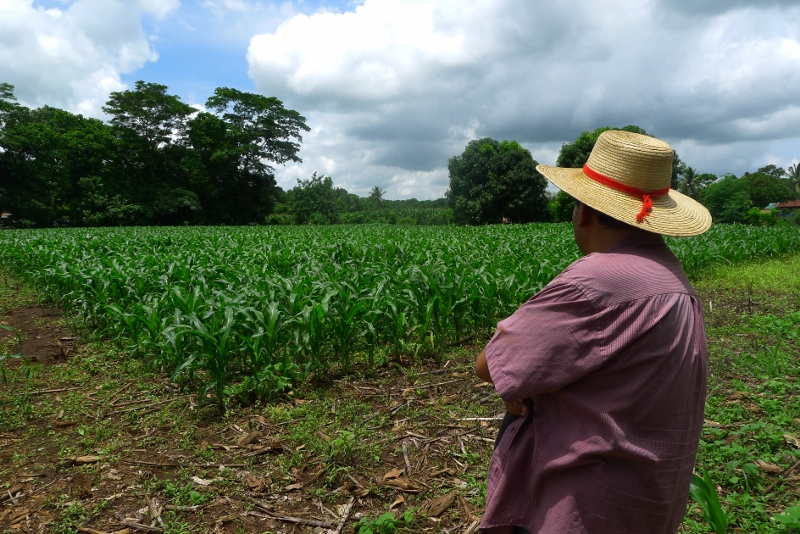
Triny’s work is neither simple nor easy. His job, along with Curt, is to introduce new and better farming techniques, and better seeds, to farmers who fight any change, no matter how reasonable, logical, or promising. Starvation and poverty are not motivators to change, rather they are reasons to never try anything new for fear of making a bad situation worse. But Semilla Nueva has not given up, and even though change is slow and hard to come by, and though its foundations are always a matter of the ebb and flow of resources, a difference has been made and its effects are growing every day.
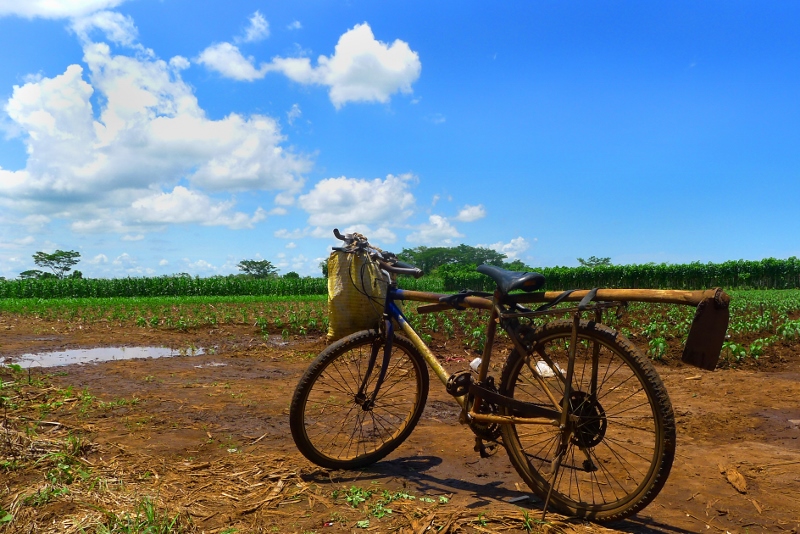
It’s hard to change old, ingrained methods of farming. Even though they are bad, it’s what the farmers know and though it’s not perfect they get a steady and guaranteed result without the fear of a possible loss of crops (due to infestation, or any other reason they imagine may result from changing methods). And it is even harder when the reason some farmers give to continue slashing and burning is that they like to sow barefoot, and when you don’t burn the old stakes they are sharp on the feet; or that a field that is left unburned looks “dirty and unkempt” and that’s embarrassing in front of the neighbors.

Experimentation which at one point saved and catapulted Europe, is avoided here. Change, the inevitable engine of growth, is avoided. And the fact that the Maya declined because of over-population and land mismanagement, changes nothing for their modern descendants. The “poor” or “3rd world” mentality of considering only today – instant results from invested money and labor – stands in the way of rapid change. Which considering how many of the poor die, from war or starvation, it only makes sense to think of today - the day you know you are still alive.

When Triny was looking to communicate with farmers about improving techniques, he thought of which note would resonate with the farmers. Money, as always, was the right key. The #1 argument against change was the need to make money right away, and eliminating any possible risk, including trying new techniques which may hinder that. Triny gathered the farmers of a community together and piled up the old stalks and leaves of corn which they generally burned after harvest. He then lit the pile on fire – this is not out of the ordinary as that is what the farmers do anyway. He then took out $1 and threw it in the fire. People were a little taken aback but did not say much, he then took out $50 (about a week’s wages) and was about to throw it in the fire when the farmers really reacted. He said: it’s my money, I can do what I want with it. He then explained that when they burned the stalks of their crops (instead of letting them decompose) they were burning money. Allowing the stalks to decompose saves a good 30% of fertilizer cost. He did not talk about the benefits of decomposition, only about the fact that when they slash and burn they are burning up their own money.
Farmers who have tried the new methods (i.e. not slashing and burning their fields after harvest) for just one year have a glint of excitement in their eyes when speaking about the new method and the success they have seen. They in turn speak to other farmers about their experiences and enact change from within the community.
Though the effects may be subtle at first, the signs of continuing success and the absence of plagues (a major concern) breeds a tangible optimism. The approach is slow but intended for the long term. Convincing farmers to try new methods, take on risk with no security, is a hard sell, but the transition, via trial and error, is an organic one and is less likely to be rejected once adopted (there are multiple instances when NGO’s came to Guatemala, set up excellent systems for change and growth – all of which were dropped the second the NGO’s pulled out).
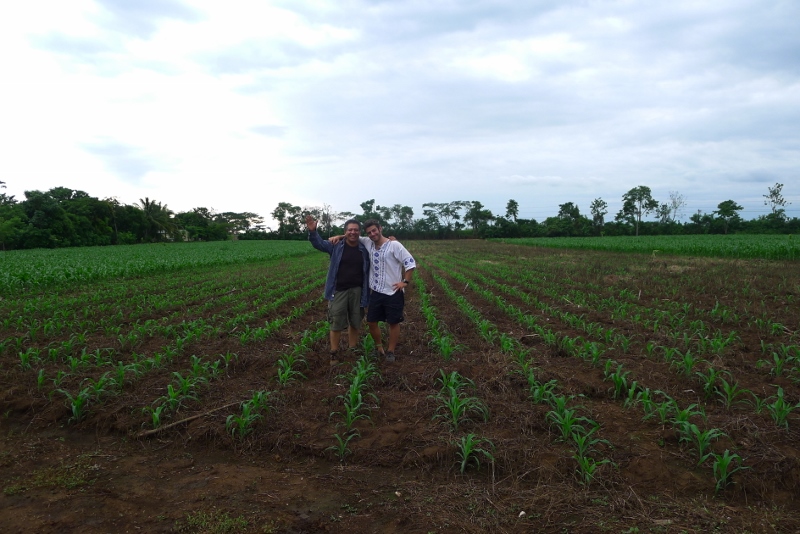
Many of the farmers Semilla Nueva works with left their homes from around Guatemala at the opportunity to start farms along the coast. The communities are tightly knit, maintain their (predominantly) native language of Mam, and vote democratically on most things involved in commununal life. They took one of the greatest risks they could by leaving their homes, so it is understandable that more risk may be unwelcome. And that is why Triny is so patient, why he works one on one with the farmers and utilizes new crops and technologies to not only help change the methods of farming but also give the farmers the opportunity to access better foods.

The importance of this work goes beyond the communities of farmers. Guatemala is one of the poorest countries in the world, with huge problems with erosion and starvation. Improving farming techniques and using better seeds is something which will help fight the hunger and erosion plaguing the country. On a personal note, t his is an organization I personally support because I know that every penny goes directly to help the farmers and in turn the people of Guatemala. I hope you will take the opportunity to look at their website and find a way in which you can support Semilla Nueva.
Triny’s War
Though most Guatemalans over the age of 20 remember something about the last civil war, not everyone was so personally touched as Triny. During the many hours we spent driving from farm to farm, he shared some of his experiences with me. War is not something that is easy to talk about, and I feel quite honored whenever a person opens up to me about their experiences. It not only gives me the opportunity to learn about a very dark aspect of the country, but it gives me the chance to share with the world a truth about our nature that I hope someday we will eliminate. And as attention grabbing as the horrors of war can be, what I always come away with when hearing or reading about these experiences is of what strength and fortitude we are possessed, of what we are capable, what we can survive, and of the depth of our humanity.
The war was at its height when Triny was still in school. He was in school, in a nearby town, when soldiers came to his village to “look for Guerillas”. The whole village was gathered in the church, and when the soldiers were left dissatisfied with the fact that there were no guerilla fighters in the town, they burned down the church – with everyone inside. Triny and his friend were just coming back from school when they found the emptiness and desolation. The soldiers heard their screams and began shooting at them. His friend was hit in the shoulder as they ducked into some bushes for cover as bullets continued whizzing around them. They made it to a hospital, but the soldiers eventually came there to look for them. When they came into the room where his friend was being treated they saw only two kids, not the guerilla fighters they were looking for and moved on.
Soon after, in a nearby village, 2 guerilla fighters were caught and the whole village was lined up on the soccer field. They were ordered to identify the other guerilla fighters in town. When they refused, 5 people were chosen at random and brought to the top of a tall tomb near the field. The officer in charge cut the throat of one of the guerilla fighters and drank his blood in front of the villagers. When everyone remained silent, the other fighter and villagers chosen were shot.
Years later when Triny was coming back from University his bus was stopped at a check point. During the questioning a soldier started feeling up his sister. When Triny asked him to stop the soldier began beating him with his rifle. When everyone’s papers were being returned, Triny and his sister did not get theirs back. Triny thought he was dead. He knew that those who did not get their papers and were told to disembark disappeared. When he came outside he recognized the officer from his school days – which saved him and his sister. The fact that I was sitting there, in the stifling heat of the coast, talking to Triny, was a matter of great luck. And yet life goes on, and Triny works hard and does not ask on which side you were on. Though he has witnessed the incredible horrors of war, he understands that peace is not attained with vengeance, rather with forgiveness. That he remains the wonderful human being he is is a miracle, and an example to us all.
Stories like this are nothing new to most people around the world. Only in the West and North America are people oblivious to the rape and carnage of civil war. What is for us a long forgotten history, and an atrocity we cannot imagine, is a recent memory or daily life for hundreds of millions of people.
My stay with Triny was one of the most impactful of my journey, and a fitting end to my 3 months in Guatemala. I had witnessed great contrasts in Guatemala, which included having both wonderful and despicable experiences. I had committed the mistake of assumption and preconception, which Guatemala helped me remedy. I met people I’m lucky enough to still call my friends, and was touched to the very depths of my heart – and all because I got off the Gringo Trail.

|

27 Feb 2015
|
|
Registered Users
Veteran HUBBer
|
|
Join Date: Nov 2012
Posts: 132
|
|
|
scent of a woman
Scent of a Woman
Gliding through valleys, around fields, up and down hills covered with wild flowers, I am engulfed in the scent of nature. When coffee trees bloom, their tangy smell overpowers me; when through strawberry fields I ride, the sweetness of the fruit penetrates to my very first memory of eating it. The salty sulfur of the shore, and slightly dank mist spraying from the distant waves, takes me again to the Black Sea and the languid, peaceful summers of youth. Farms, that unmistakable smell of hay and manure, brings a sense of home – regardless of where you grew up. The freshness of passing by a river or a lake, the air slightly cooler… the refreshing cleanliness of earth after rain – I smell it all because I ride through it exposed, no roof or windows to bar my experience.
When I ride through a town I am made hungry by the smell of bread wafting from bakeries, and the succulent smell of meat being grilled on the corners and in the park. I don’t have to look at the trees of the forests through which I ride – I can smell them. And no matter where I am in the world when I smell pine I think of the north, of tramping through the woods and hiking up mountains. The sweltering tropics bring the sourness of sugarcane fermenting on the side of the road, and the lushness of jungles the overwhelming smell of a thousand different plants growing in a single acre. Then again I am so often chocked by the black plumes of diesel obscuring the sky and screening my way, by the brake dust of a million trucks struggling over endless mountain curves. Sometimes it is the rankness of factories that line the plains, or are tucked in gorges, that make me reach for a mask and bandana. Or the putrid decomposition of dogs, horses, cows, snakes, iguanas And the mixed feelings about the oddly sweet pepper smell of garbage or grass burning on the side of the road. All these burn into my memory, and I can lay in a hammock thousands of miles, and many years, away from those moments, close my eyes, and again find myself flying on my steed and experiencing those places anew.
But every now and then my heart skips a beat because it is the scent of a woman that embraces me as I rush along the world – and time slows to a crawl. Sometimes she just washed her long, luscious, black hair, and the smell of citrus and flowers flows behind the car she’s in. Sometimes it’s her perfume, freshly dabbed on her neck that I sense as she walks out of her house. I never stop, my momentum carries me forward even though I’ve long since released the throttle, and the scent of her passes and I awake again in the rushing world. But like the strawberry fields, like the lilac of parks, or the wild herbs along a canopied alley, her scent lingers in my mind and I forget in which country I am, I forget why I’ve ridden so long and so far, and I can only remember the love I have left behind, and the joy of burying my face in her neck – knowing that sweetness is all mine, and there is nowhere any momentum can take me.
Last edited by SteelhorseNYC; 28 Feb 2015 at 15:26.
|

4 Mar 2015
|
|
Registered Users
HUBB regular
|
|
Join Date: Sep 2013
Location: South West France
Posts: 34
|
|
|
Words
For a man whose first language is not english, ?? (I think). Your writing is so good, thankyou and keep up the fabulous writing/words.
|

5 Mar 2015
|
|
Registered Users
Veteran HUBBer
|
|
Join Date: Nov 2012
Posts: 132
|
|
Thanks Canyon!
English is actually my 3rd language... now if I could only learn to write better in Spanish so that my friends in South America would stop complaining 
|

9 Mar 2015
|
|
Registered Users
Veteran HUBBer
|
|
Join Date: Nov 2012
Posts: 132
|
|
|
Honduras - Love or Death
Honduras: Love or Death
The little strip of Honduras that separates El Salvador from Nicaragua is only 132km. That’s no more than a couple of hours riding. I thought I would stop in Choluteca for a couple of days just to meet a fellow biker and get a little taste of Honduras, and then move on. Fate, it seems, had a little more in store for me.
Mario was a rare find in Central America – he was planning to ride his motorcycle all the way to Tierra del Fuego from Honduras. Though most cross continent riders are European or North America, there are occasionally Latinos that make the big trek, but they are few in number and usually from South America. But Mario was determined not to let the low wages and conservative culture of Honduras stand in the way of his dream. In fact, as of this writing, he has completed his journey and is returning to Honduras having done what no other Honduranean has done (as far as I know).

I had no intention of going up north to Tegucigalpa, Sand Pedro Sula (two more of the world’s most dangerous cities), or the islands. But Mario had some family with whom I could stay on the way, so I decided to make an exception and check out the island Utila – one of the best places to scuba in the world. I don’t scuba but I do love the sea, and a few days in paradise did not sound so bad.
Most of Honduras is not very good riding. The condition of the roads is some of the worst in Central America, with potholes so big I was afraid if I rode into one i would never ride out. And outside the mountains, which are of course beautiful, and offer incredible views of the neighboring countries and the Pacific, the landscape is impressive only in how hot and humid it gets. Of course I did have another brush with death in the shape of a semi trying to pass another semi around a blind curve so as to make two walls of metal rushing toward me down the mountain. How I manage to get out of the way, and squeeze past on the non-existent shoulder is still a matter of miracles.

As in El Salvador, Honduraneans are very typical of Central America, and there was little to no indigenous culture to be found. However the mixes of Spanish, Native and Negro bloods have produced some incredibly beautiful women. Every country has its share of mixing, but I have yet to find such interplay of the 3 races in so many people – very striking. On my ride from Choluteca to La Ceiba (for the ferry to Utila) I must have almost crashed a dozen times looking at the beauties selling fruit on the side of the road.

Utila sits on the world’s second largest barrier reef, and when I say “sits on” I mean I walked off a dock, swam for about 20 seconds and was on the reef. Considering the wonders I saw while snorkeling, I can only imagine what can be seen scuba diving here! The reef, the fish, the stingrays… so many colors and forms, and swimming in and around them and their world felt like what I imagine flying around our own world would be like. Of course on shore and in the midst of humans there was no escaping the petty drama that follows us wherever we go, and sitting on the beach, sipping a fresh juice, I could not help but hear about the petty bickering which mars what would otherwise be paradise. I did however meet a guy named Sergey at one of the bars, who, after many hours of drinking and joking on his boat, turned out to have worked for the same company as me - 8 years ago in New York. I always love the feeling I get of a shrinking world whenever I meet people that I have known so many years ago and on the other side of the planet.

After a few days of “paradise” I took the ferry back to the mainland, picked up Georgia, and hauled ass back to Choluteca. One of the biggest festivals in Honduras was taking in place in San Marcos, in the mountains, and I did not want to miss the rare opportunity of actually being somewhere when some important event was happening (it seems that all the cool festivals are always months away, no matter where I am or what time of year it is).
Mario, Emerson and I drove up to San Marcos and threw ourselves into the thick of music, people, and food. It felt like all of Honduras was packing into this tiny mountain village. There were a dozen music stages with everything from ballenato, salsa, reggaeton… Emerson knew half the town so we spent half of our time greeting people. And ask quickly as we got there did everyone else disappear when I met “chinita”. I don’t know what it was but there was something about her that made me want to dance with her, and only her. But, being the tit that I am I chatted for a few minutes and went on my way with Mario – regretting my own spinelessness. But fate intervened and threw her into my path again, and this time I did not let it slip. We danced and laughed and talked for an all too brief moment before she had to go, but it was enough for me. I became blind to everything around me, and extended my stay in Honduras just to see her again.
I was infatuated. I offered to give her a ride back to Tegucigalpa just to spend a few more days with her. I knew I could not stay, but I wanted to see where it would all go. And it went to many beautiful places and moments, including a national reserve in the mountains outside the city. We went for a hike in the forest, during the rainy season, in the epicenter of the world’s dengue epidemic. And because I could think of nothing but her I neglected to put on sunscreen, or bug repellent – it just all seemed irrelevant. We had a lovely time, and a couple of days later I brought her back to Choluteca.
We arrived in the evening and went straight to a softball game that her dad was umpiring. I was instantly deep into the game, focusing more than I thought I could on something so trivial. And then suddenly I felt really tired. It made sense considering the long, hot ride I just had, and it was getting late. I decided to lay down for a few moments and take it easy. The next thing I knew I was being shaken awake by chinita and her family – the game was over. I opened my eyes but could not move, my stomach was killing me and I felt like a giant, heavy blanket was covering me – I couldn’t even lift up my head. But everyone was leaving and I couldn’t just stay there in the bleachers, so I had chinita help me up. My head began to swim and I stumbled alongside her toward Georgia. It must have been quite a sight! Her family thought I was drunk, but all I could say was that I was very tired. I mounted Georgia and followed chinita to Mario’s house. I don’t know how I did not fall over – I couldn’t see straight, everything was swimming, I was too weak to stay upright or hold Georgia straight… but I did, and somehow made it back to Mario’s house. There was none home, but I told chinita to go on.
Eventually someone came home and let me in. I stumbled into Mario’s room and went to bed. A few minutes later the headache and fever began. It was hot, humid and miserable. I started taking Advil and Tylenol and even a Percocet, as nothing was helping. I had enough sense to find a rag and get some ice water in a cup. The problem was the ice would melt instantly and I would have to get up every few minutes to get more, along with more water. The whole night I spent going to the bathroom, getting and drinking more water, making ice and applying the cold compress. All I wanted to do was lay there and rest, but there was no one to take care of me. Finally toward morning the fever broke, but the headache persisted, and a general feeling of discomfort and weakness settled over me, and would not leave me for 7 days. Every minute felt like an hour. No position was comfortable, my skin was irritated by everything, I had no appetite, and every time I would close my eyes I had to get up again.
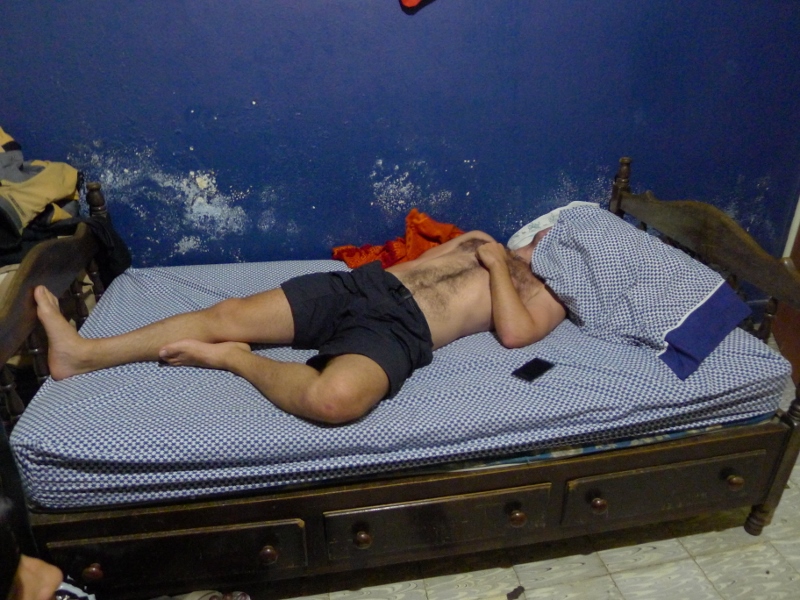
It was not until a few days had passed like this that I finally saw a doctor and got a blood test which confirmed my platelets and white blood cells were dropping rapidly - which confirmed that I had dengue. Finally chinita came to be with me for a few hours. In fact, during my week of hell I only had someone to bring me something and be with me for less than 24 hours. Sometimes there wouldn’t be anyone to take me to the lab, so I would get in a cab to go the 5 blocks to get my blood tested. At least in the evening someone would bring me to the clinic for my IV of electrolytes. At night it would always be worse, and my body would spasm out of discomfort. The doctor prescribed coconut juice, fruit juices, and the like… but it took so much to beg people to help me find it. Sure, they were nice enough to let me stay, but I never thought people could ignore so much someone who was potentially mortally ill. I can’t imagine someone staying at my house and me not doing everything I could to make them feel better. I never felt so alone.
By the end of the week my platelet and white blood cell count was down to almost zero. At this point if someone sneezed in the same room as me I may have died from the cold. I kept waiting for the numbers to stop dropping (which would be a sign that the worst was over). Eventually they did, as I am here to write about it, and after a day they slowly began to rise. I had faced death yet again, and somehow survived. But the toll the dengue took on my body would not go away for a very long time. I left Honduras a few days after I was officially out of the danger zone and rode into Nicaragua. But I was not the same man – I was weaker, generally nauseous, had a constant headache, and barely had the strength to ride.
But I had no choice but to continue my journey - I was dammed if a mosquito and the blindness of infatuation would be what put an end to my book.
|
|
Currently Active Users Viewing This Thread: 2 (0 Registered Users and/or Members and 2 guests)
|
|
|
 Posting Rules
Posting Rules
|
You may not post new threads
You may not post replies
You may not post attachments
You may not edit your posts
HTML code is Off
|
|
|
|

Check the RAW segments; Grant, your HU host is on every month!
Episodes below to listen to while you, err, pretend to do something or other...

2020 Edition of Chris Scott's Adventure Motorcycling Handbook.
"Ultimate global guide for red-blooded bikers planning overseas exploration. Covers choice & preparation of best bike, shipping overseas, baggage design, riding techniques, travel health, visas, documentation, safety and useful addresses." Recommended. (Grant)

Led by special operations veterans, Stanford Medicine affiliated physicians, paramedics and other travel experts, Ripcord is perfect for adventure seekers, climbers, skiers, sports enthusiasts, hunters, international travelers, humanitarian efforts, expeditions and more.
Ripcord Rescue Travel Insurance™ combines into a single integrated program the best evacuation and rescue with the premier travel insurance coverages designed for adventurers and travel is covered on motorcycles of all sizes.
(ONLY US RESIDENTS and currently has a limit of 60 days.)
Ripcord Evacuation Insurance is available for ALL nationalities.
What others say about HU...
"This site is the BIBLE for international bike travelers." Greg, Australia
"Thank you! The web site, The travels, The insight, The inspiration, Everything, just thanks." Colin, UK
"My friend and I are planning a trip from Singapore to England... We found (the HU) site invaluable as an aid to planning and have based a lot of our purchases (bikes, riding gear, etc.) on what we have learned from this site." Phil, Australia
"I for one always had an adventurous spirit, but you and Susan lit the fire for my trip and I'll be forever grateful for what you two do to inspire others to just do it." Brent, USA
"Your website is a mecca of valuable information and the (video) series is informative, entertaining, and inspiring!" Jennifer, Canada
"Your worldwide organisation and events are the Go To places to for all serious touring and aspiring touring bikers." Trevor, South Africa
"This is the answer to all my questions." Haydn, Australia
"Keep going the excellent work you are doing for Horizons Unlimited - I love it!" Thomas, Germany
Lots more comments here!

Every book a diary
Every chapter a day
Every day a journey
Refreshingly honest and compelling tales: the hights and lows of a life on the road. Solo, unsupported, budget journeys of discovery.
Authentic, engaging and evocative travel memoirs, overland, around the world and through life.
All 8 books available from the author or as eBooks and audio books
Back Road Map Books and Backroad GPS Maps for all of Canada - a must have!
New to Horizons Unlimited?
New to motorcycle travelling? New to the HU site? Confused? Too many options? It's really very simple - just 4 easy steps!
Horizons Unlimited was founded in 1997 by Grant and Susan Johnson following their journey around the world on a BMW R80G/S.
 Read more about Grant & Susan's story
Read more about Grant & Susan's story
Membership - help keep us going!
Horizons Unlimited is not a big multi-national company, just two people who love motorcycle travel and have grown what started as a hobby in 1997 into a full time job (usually 8-10 hours per day and 7 days a week) and a labour of love. To keep it going and a roof over our heads, we run events all over the world with the help of volunteers; we sell inspirational and informative DVDs; we have a few selected advertisers; and we make a small amount from memberships.
You don't have to be a Member to come to an HU meeting, access the website, or ask questions on the HUBB. What you get for your membership contribution is our sincere gratitude, good karma and knowing that you're helping to keep the motorcycle travel dream alive. Contributing Members and Gold Members do get additional features on the HUBB. Here's a list of all the Member benefits on the HUBB.
|
|
|















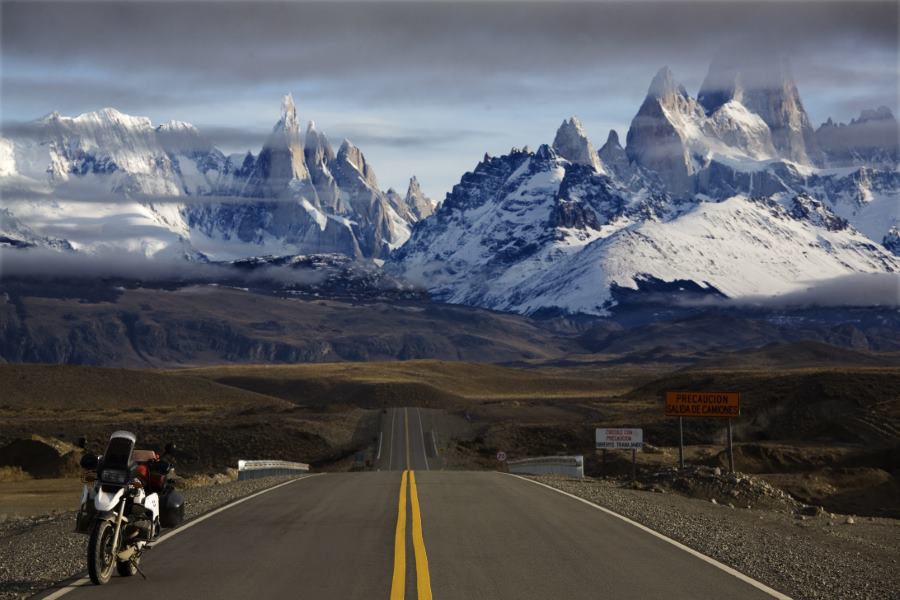
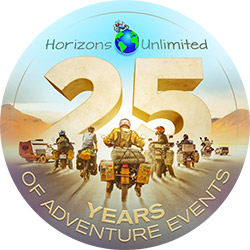
 15Likes
15Likes









































 Linear Mode
Linear Mode










